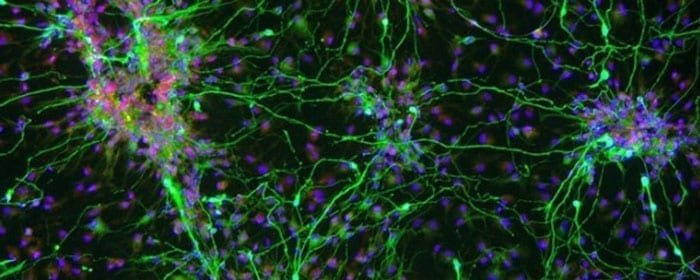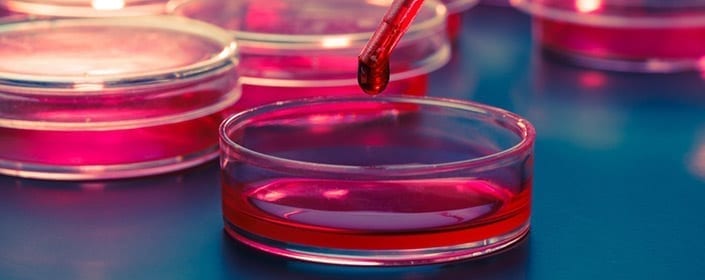
by admin | Mar 22, 2018 | Parkinson's Disease, Stem Cell Research
A recent review has outlined the potential of using stem cells to treat Parkinson’s Disease. Parkinson’s Disease patients have been limited by the realities of their treatment options. Generally, treatments act to relieve symptoms that occur with Parkinson’s Disease rather than the underlying cause. More specifically, by substituting a brain chemical called dopamine, or by trying to enhance the effects that naturally occurring dopamine has in the brain, these treatments aim to reduce the motor symptoms that are commonly associated with the disease. Unfortunately, none of these treatments can actually regenerate the dopamine neurons that are destroyed by the disease.
Given the potential for stem cells to replace critical cell groups, researchers in neuroscience have reasoned that stem cells could provide a cell-based therapy for Parkinson’s Disease patients. Given that a loss of dopaminergic functioning in a key feature of the disease, using stem cells to restore this functioning could potentially relieve symptoms and also slow the progression of the disease.
Based on this rationale, researchers have wanted to perform clinical trials to determine how stem cells impact Parkinson’s Disease patients. Based on the research thus far, it seems that mesenchymal stem cells are the best candidate for cell-based therapies against Parkinson’s disease. However, there are several details that need to be worked out to determine which tissue or tissues would be best for deriving these stem cells and exactly how to use the stem cells to help patients. For instance, according to the authors of the review, it is likely that Parkinson’s Disease patients will need the transplant of cells that produce another brain chemical, serotonin, in addition to those that produce dopamine because serotonin is implicated in the non-motor symptoms of the disease.
Research to develop cell-based therapies for Parkinson’s Disease is still in its infancy. However, as our understanding of the disease itself – as well as of how stem cells can be used to treat neurodegenerative diseases – we will hopefully start to leverage stem cells to develop effective therapies that help Parkinson’s Disease patients.
Learn more about our stem cell treatment for Parkinson’s Disease here.

by admin | Dec 27, 2017 | Health Awareness, Parkinson's Disease
Even though there is no specific diet that can treat the symptoms of Parkinson’s Disease, one can have a proper and healthy diet that can help improve the overall symptoms. By consuming a lot of vegetables and fruits, one can keep themselves energized. Staying properly hydrated can help deal with the common symptoms like low blood pressure and constipation.
Making changes in the timing of meals can also help the medications affect the body in a better way and avoidance of certain foods can help prevent the side effects.
Dietary Changes That Can Help With Symptoms of Parkinson’s Disease:
Having low blood pressure is common with those with Parkinson’s. It is usually a side effect of the medication. Increasing fluid intake and salt in the diet can help increase the blood pressure to normal, however, it should be discussed with a physician. Having small but frequent meals can also help with blood pressure challenges.
A common symptom of Parkinson’s is constipation. An increase in daily fiber consumption diet can help with this problem. Drinking six to eight glasses of water daily is healthy. Starting the day with warm liquids can help stimulate bowel movement and help maintain regularity. Some common sources of fiber are fruits and vegetables, cereals and whole grains.
Medications taken for Parkinson’s usually lead to a difficulty in swallowing food and causes thirst. To avoid this problem, include up to eight glasses of water daily and take sips of water after each bite when eating. Eat food that has sauces and or gravy and butter. You can also ask your doctor to prescribe some artificial saliva producing products.
Muscle cramps are also observed in Parkinson’s patients, especially during night time when the medication usually wears off. Eating yellow mustard that contains turmeric is very beneficial to help. Proper hydration maintenance also prevents cramps.
How to Help Increase Your Appetite?
Having a poor appetite is also another common symptom. Poor appetite can be a result of depression. If so, talk to your doctor to be treated and this will potentially help improve appetite.
Some tips to help increase your appetite are:
- Have small, frequent, but nutritious meals
- Go for a daily walk to stimulate appetite
- Include your favorite foods for more enjoyment
- Consume the high-calorie foods first
- Do not drink beverages prior to a meal or during to avoid feeling full
Antioxidants and What Foods Are Rich with Them?
Antioxidants are highly beneficial. They are responsible for clearing out the free radicals present in the body. Free radicals are basically toxic elements that are formed by sunlight, pollution, smoke and cigarettes. Oxidative stress is caused due these free radicals and it highly associated with Parkinson’s and aging.
A diet that is rich in antioxidants helps reverse cellular damage and oxidative stress. Some examples of these foods are:
- Fruits: Pears, grapes, berries, and apples.
- Vegetables: Kale, artichokes, okra, bell peppers.
- Nuts: Walnuts, hazelnuts, and pecans.
- Legumes: Kidney beans and lentils
- Beverages: Tea and coffee
- Eggs
- Dark chocolate

by admin | Mar 21, 2016 | Parkinson's Disease, Studies
Though research has shown that stem cells are therapeutic candidates for neurodegenerative diseases like Parkinson’s disease, scientists have been working on overcoming the challenges associated with effectively delivering these cells to the brain. A recent study, published in the journal Rejuvenation Research, demonstrated that intranasal delivery of stem cells provided both physiological and behavioral benefits in a rat model of Parkinson’s disease.
Once researchers had determined that stem cells could help patients suffering from brain disorders, a number of interventions were attempted. Surgical transplantation, though invasive, has been a popular method for direct stem cell delivery to the brain. However, this technique often causes local trauma and also tends to leads to problematic immune responses that make the transplant ineffective. Delivering cells through veins or arteries is a less invasive method for providing the brain with these cells, but this method can be less effective, with the cells sometimes traveling to organs other than the brain and becoming trapped there.
In their article, Therapeutic Efficacy of Intranasally Delivered Mesenchymal Stem Cells in a Rat Model of Parkinson Disease, Lusine Danielyan and colleagues describe their previous work that showed that intranasal application of mesenchymal stem cells lead to the successful integration of these cells in parts of the brain that are critical in Parkinson’s disease. Building on this work, they now show that intransal delivery of stem cells is not only feasible but has practical clinical applications. In a rat model of Parkinson’s disease, rats normally experience dopamine depletion in certain areas of the barin, as well as increased levels of inflammatory cytokines, which are cells of the immune system. Intransal administration of stem cells prevented both of these effects in the rat model.
Of particular significance is that researchers did more than show that intranasal delivery of stem cells leads to physiological changes that are consistent with effective Parkinson’s disease therapy. They also showed that the technique had therapeutic behavioral effects. When intranasal administration of stem cells was applied to the rat model of Parkinson’s dieases, motor function improved. As motor dysfunction is a hallmark of Parkinson’s disease, this finding demonstrates the significant promise that intransal delivery of stem cells holds for treating Parkinson’s disease.
Reference
Danielyan, L., Schafer, R., von Ameln-Mayerhofer, A., Bernhard, F., Verleysdonk, S., Buadze, M., . . . Frey, W. H., 2nd. (2011). Therapeutic efficacy of intranasally delivered mesenchymal stem cells in a rat model of Parkinson disease. Rejuvenation Res, 14(1), 3-16. doi: 10.1089/rej.2010.1130

by admin | Oct 19, 2015 | Parkinson's Disease, Stem Cell Research, Studies
Earlier this year, a group of scientists led by Yoo-Hun Suh at the Seoul National University Medical College published their work demonstrating the potential use of human adipose-derived stem cells (hASC‘s) in Parkinson’s therapy. Their article, Therapeutic potentials of human adipose-derived stem cells on the mouse model of Parkinson’s disease, was published in the academic journal Neurobiology of Aging.
Many Parkinson’s disease treatments aim to compensate for the loss of dopamine that is seen in the brains of Parkinson’s patients, but because those treatments have their limitations, focus has shifted to the use of stem cells as a therapeutic option for Parkinson’s disease. The rise in stem cell research for Parkinson’s disease has also increased as scientists have recognized the importance of mitochondrial deterioration in the development of Parkinson’s disease.
Stem cells that can be easily transplanted and readily proliferate are seen as ideal stem cell candidates for such treatments. hASC are pluripotent, meaning they can differentiate into a number of different types of cells, including cells that resemble neurons, the cells of the brain. These particular stem cells are useful because they tend not to create a reaction by the immune system, and they can pass the blood-brain barrier and proliferate within the brain.
In this study, the researchers used a common mouse model of Parkinson’s disease, which is created with a specific neurotoxin called 6-hydroxydopamine (6-OHDA). They injected hASC into the veins of mice and assessed how these stem cells affected Parkinson’s disease symptoms, dopamine levels in the striatum, the part of the brain affected by Parkinson’s disease, and the integrity of mitochondria.
The researchers found that hASC improved the motor deficits in the mice modeled to display Parkinson’s disease symptoms. Using positron emission tomography (PET) imaging, the researchers also showed increased dopamine levels in the striatum of these mice. Finally, the researchers also showed that mitochondrial function was restored in mice who received hASC injections.
Overall, this study captures the significant potential of hASC to provide successful therapies for neurodegenerative disorders like Parkinson’s disease. That the injection of these cells in a mouse model of Parkinson’s led to both behavioral and physiological improvements in mice demonstrates the great promise for stem cell therapies, and in this context, particularly for therapies developed from adipose-derived stem cells.
Learn more about stem cell treatment for Parkinson’s disease.
Reference
Choi, H., Kim, H., Oh, J., Park, H., Ra, J., Chang, K., & Suh, Y. (2015). Therapeutic potentials of human adipose-derived stem cells on the mouse model of Parkinson’s disease. Neurobiology of Aging, 36(10), 2885-2892.





 St. Petersburg, Florida
St. Petersburg, Florida
